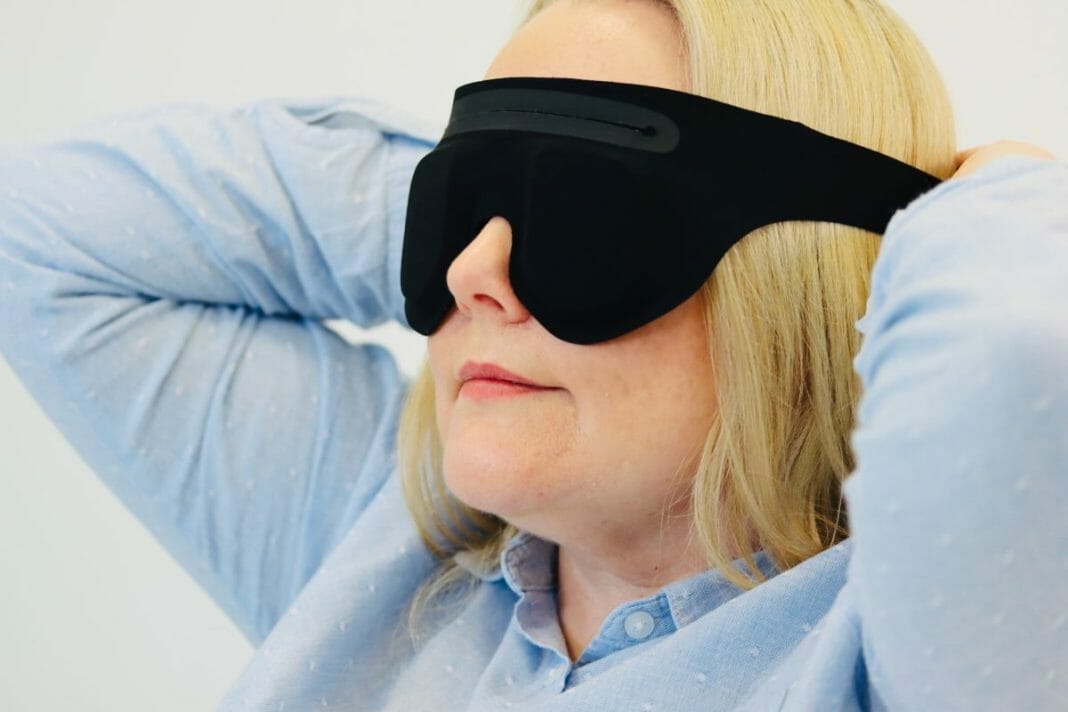A pioneering treatment to prevent blindness in people suffering from diabetic retinopathy is set to benefit NHS patients for the first time, following the adoption of PolyPhotonix’s Noctura 400 sleep mask by Ashford and St Peter’s NHS Foundation Trust. Shown to improve patients’ visual acuity,the mask could potentially save the health service millions of pounds a year.
Backed by the RENDER Study, the innovative sleep mask has demonstrated improvement and stabilisation of diabetic eye disease in 96% of patients.1 It is an early stage non-invasive alternative to current, later-stage invasive treatments such as eye injections for patients with the condition; which is a leading cause of blindness in Europe.3
Based on research undertaken by Ashford and St Peter’s NHS Foundation Trust, improving patient outcomes with an earlier stage intervention could save the NHS £3,000 per patient. It is believed that the sleep mask could deliver cost savings estimated in excess of £180m per year if adopted across the NHS.2
Moreover, it could ease pressure on NHS services by reducing hospital clinic appointments and the use of eye injection treatments at a later stage. Diabetes is a major health crisis facing the UK and costs the NHS around £10bn a year,4 most of which goes in treating complications, including eyesight damage.
The current NHS pathway involves monitoring patients with early signs of diabetic retinopathy until their eyes deteriorate and they qualify for treatment intervention. However, the Noctura 400 sleep mask uses intervention at an early stage to prevent future problems before they start.
The sleep mask treatment can be worn during normal hours of sleep and can prevent the need for expensive and time intensive injections directly into the eyeball, which can be stressful and unpleasant for patients, and comes with a risk of side effects.1
Michelangelo Biasiucci, 64, from London, is one patient whose life has been transformed by using the sleep mask. He said:
“After being referred to the hospital by my GP, I was diagnosed with diabetic retinopathy. Part of my treatment for this was to have injections in my eyes, and looking back, I don’t know how I tolerated them!
“I was relieved that not so long after, my consultant prescribed the mask. I would say that the mask has given me my life back – not only can I see so much clearer, but it has enabled me to carry out my job safely again. As a driver, I can now work safely again, especially at night, thanks to the mask.”
The mask maintains or improves patient’s vision and the physiological effects of diabetes on their eyes by delivering a precise level of light at a particular wavelength during a patient’s normal hours of sleep in a home-based setting. Noctura 400 administers low-level light to prevent the eyes’ increased demand of oxygen at night and reduces the damaging effects of diabetic retinopathy on patients’ eyesight.
Commenting on the treatment’s benefits Mr Ulrich Meyer-Bothling, Consultant Ophthalmic Surgeon at Ashford and St Peter’s Hospitals NHS Foundation Trust, said:
“The Trust’s decision to offer the sleep mask as part of its diabetic retinopathy pathway is great news for patients and the NHS alike.
“For patients, it represents a pain-free treatment option for their condition. It is non-invasive, and they are, in effect, treated whilst they sleep. It also doesn’t require patients to attend the hospital as frequently, giving them more of their time back. It represents a gentler approach to treating or even preventing diabetic retinopathy and diabetic macular oedema. I’m proud that most of the patients I have treated with the mask have shown stabilisation and improvement in their diabetic eye disease.”
Richard Kirk, Chief Executive of PolyPhotonix, said:
“For the NHS, treating diabetic retinopathy patients with the Noctura 400 sleep mask represents a cost-effective alternative to existing treatments. At a time when our healthcare budgets are already stretched, adding the sleep mask to existing care pathways makes sound financial sense in helping healthcare services recover from the pandemic and freeing up hospital appointments for those in greater need of emergency care.
He concluded, Most importantly, it prevents problems before they arise and enables doctors to improve patient care.”
References
- Meyer-Bothling U, Meyer-Bothling O, Pinney M. A Real-World Single-Centre Study of Patients with Diabetic Macular Oedema Who Wore a Home-Use Sleep Mask (Noctura 400) for One Year. Journal of Ophthalmology. 2021. –> Meyer-Bothling U, Meyer-Bothling O, Pinney M. A Real-World Single-Centre Study of Patients with Diabetic Macular Oedema Who Wore a Home-Use Sleep Mask (Noctura 400) for One Year. Journal of Ophthalmology. 2021;2021:6612126
- PolyPhotonix Data on File. 2021.
- Hristova E, Koseva D, Zlatarova Z, Dokova K. Diabetic Retinopathy Screening and Registration in Europe-Narrative Review. Healthcare (Basel). 2021;9(6): 745.
- NHS England. NHS Prevention Programme cuts chances of Type 2 diabetes for thousands. 2022. Available from: www.england.nhs.uk/2022/03/nhs-prevention-programme-cuts-chances-of-type-2-diabetes-for-thousands/#:~:text=Evidence%20has%20shown%20that%20the,effective%20in%20the%20long-term. Accessed October 2022.
